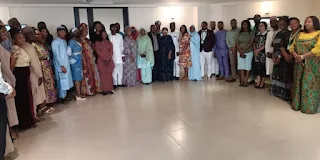education, that are deeply ingrained within our social norms, discriminatory policies, and lack of resources,” she said.
Ms Faruk said President Tinubu is fully committed to gender equity and that her office is also focused on aiding in the advocacy for women and girls across different sectors.
The report
The report aimed to determine the explanatory powers of the Global Partnership for Education (GPE) gender responsiveness theory of change related to girls’ education outcomes.
Applying a mixed method research methodology, the gender review first conducted a trend analysis of two girls’ education outcomes to establish patterns in the period before sector plans were introduced in Nigeria and the period during education sector planning in Nigeria (2012-2023).
Amongst the six states (Jigawa, Kaduna, Kano, Katsina, Sokoto, and Zamfara) studied, the gender review found that states with the highest secondary school completion rates for girls in the sector planning years such as Jigawa State had the lowest rate of child marriage.
Dangote adbanner 728x90_2 (1)
Meanwhile, states with the lowest completion rates for girls in the education sector planning years such as Kaduna State also had the highest rates of child marriage.
The second stage of the gender review sought to explore relationships between the trend in girls’ education outcomes established in the first step in the analysis and the structures and functions of bureaucracy prescribed by the GPE model of gender-responsive education.
Here, the analysis found clear and consistent correlations, thus confirming the prescriptive powers of the GPE model of gender-responsive education planning.
Further findings of the gender review of education planning in Nigeria constitute a robust evidence base around which girls’ education advocates and advocacy networks can frame policy advocacy messages and design campaigns on the dos and don’ts of government for positive girls’ education outcomes.
“This also has methodological implications for GPE’s approach to country reviews of education sector planning, pointing to the importance of linking bureaucratic processes of government to girls’ education outcomes,” the report said.
Ms Faruk said her office will play a pivotal role in several key areas such as Social Inclusion and Political Empowerment for Women; Economic Empowerment for Women; Combating Domestic Violence and Abuse against Women; Assisting the most marginalised Women in Nigeria; and Promoting Educational Parity for Women in Nigeria which was the focus of Tuesday’s programme.
“I will collaborate closely with both national and sub-national authorities to integrate women’s initiatives and needs into the policies and programmes of all ministries, departments,
and agencies of the federal government. This collaborative effort aims to foster a national consensus on policies and environments conducive to the empowerment and advancement of women, in partnership with relevant stakeholders,” Ms Faruk added.


Post a Comment